
When you enter Cha's Restaurant in Shanghai, it feels like a step back in time to 1960s Hong Kong, and this attraction it seems, is earning a faithful following which can be seen waiting in line for hours just to get a seat.
Once inside, they quickly order the boluo bau, freshly baked "pineapple buns" that have tempted generations of Hong Kong children. There is no pineapple in them, but the sweet crispy crust that tops each bun is scored into diamond patterns like a pineapple. Most customers will wash it down with a glass of chilled sweet, milky tea.
Nostalgia permeates the place. Old-style electric fans, antique bottles, condiment bottles on stainless steel trays, and green-and-white tiles on the floor - all these seem to come out of the set of a Wong Kar-wai film about the good old, bad old days of Hong Kong.
No wonder, because Charlie Hau himself is a filmmaker from Hong Kong.

Born and raised in Hong Kong, Hau realized his ambitions to become a film producer, but he never thought about opening a restaurant - until 2007. Shuttling between Hong Kong and Shanghai, Hau found it hard to locate a satisfyingly authentic cha chan teng in Shanghai - that classic Hong Kong cafe offering grassroots comfort food and drink.
There were already quite a number of these cafes in Shanghai as larger numbers of people from Hong Kong came to Shanghai for pleasure and business. But few of these offered a 100-percent Hong Kong-style menu. Instead, Shanghai-style cold dishes and Sichuan-style spicy food often adulterated the menus.
"My friend told me there were at least more than 300,000 Hong Kong people working and living in Shanghai then. I was stunned," Hau says. "I told myself, if there are so many, it is enough to support my business."
But many friends were not so encouraging, as they were unsure if the local clientele would accept a totally Hong Kong-style menu.
But Hau has had the last laugh. His risk paid off and his restaurant is now one of the hottest spots in Shanghai.
His insistence on authentic ingredients, decor and good service has pushed the cost up, but his efforts have been endorsed by a growing clientele - so much so that he opened his second cafe last year.
"Shanghai people are more open than I expected. I feel very lucky to see such success here," he says, noting that more Hong Kong entrepreneurs are looking for opportunities here.
His secret to success is attention to detail. For example, Hau says his best seller is the iced milk tea. The balance of milk, tea and sugar makes the tea here smooth and rich, but there is one more secret.
Most cafes or restaurants add ice cubes into the hot tea to cool it down, but the melting ice dilutes the drink and affects the taste.
Hau, however, found a brilliant way to cool the drink without affecting the flavor. He uses the milk tea itself to make ice cubes, rather than water. As a result, the milk tea remains nice and rich even when the ice cubes melt.
"I was inspired by Japanese cafes, actually. They use coffee-made ice cubes to prepare iced coffees, so that the flavor won't be diluted," he explains.
Food-wise, Hau says the best seller is the soy sauce chicken in rose wine, a recipe which Hau found in an out-of-print cookbook.
Gulao meat, the Cantonese sweet-and-sour pork, and scrambled eggs with shrimps are also popular. As Hau says, there are no secret recipes, just good authentic cooking. And you can also sample other cha chan teng classics such as instant noodles with luncheon meat and a fried egg, stewed spaghetti and rice with chicken ala king.
xieyu@chinadaily.com.cn

2013 Chinese New Year |

Hidden dragons, crouching tigers |
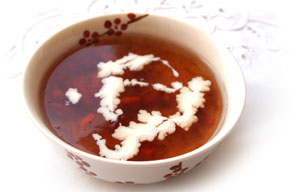
Soap beans, silver ears and peach gum |

Special:Winter Solstice |
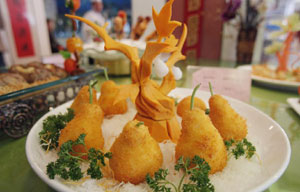
'Potato festival' kicks off in Shandong |
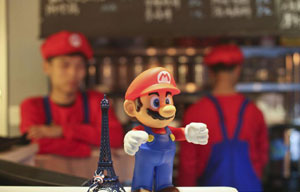
Mario themed restaurant opens in Tianjin |
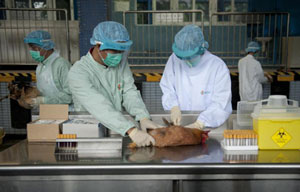
HK carries out avian influenza tests on imported chicken |
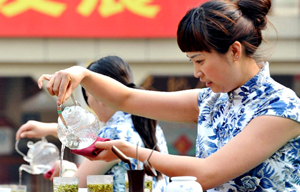
2013 China Tea Conference kicks off in Zhejiang |